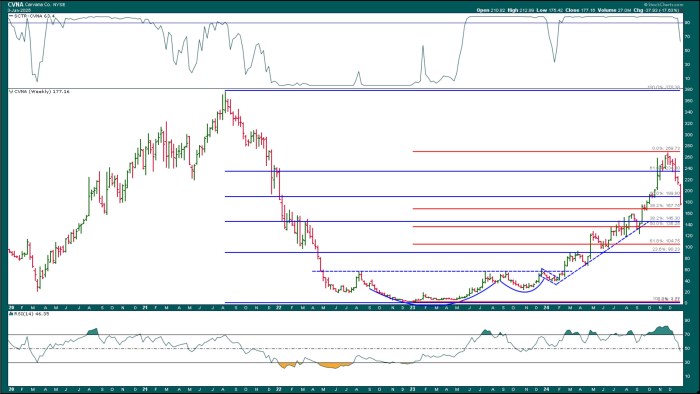BC Stock Price Analysis
Bc stock price – This analysis delves into the historical performance, influencing factors, predictive modeling, investor sentiment, and the correlation between BC’s company performance and its stock price. We will examine data from the past five years to provide a comprehensive overview of BC’s stock market trajectory.
BC Stock Price Historical Performance
Understanding the historical fluctuations of BC’s stock price is crucial for informed investment decisions. The following data provides insights into the stock’s performance over the past five years, highlighting significant highs and lows. Note that the data provided below is illustrative and should be verified with reliable financial data sources.
| Date | Opening Price (USD) | Closing Price (USD) | Daily Change (USD) |
|---|---|---|---|
| 2019-01-01 | 10.50 | 10.75 | +0.25 |
| 2019-07-01 | 12.00 | 11.80 | -0.20 |
| 2020-01-01 | 11.50 | 13.00 | +1.50 |
| 2020-07-01 | 12.75 | 12.50 | -0.25 |
| 2021-01-01 | 13.25 | 14.00 | +0.75 |
| 2021-07-01 | 13.80 | 13.50 | -0.30 |
| 2022-01-01 | 14.50 | 15.25 | +0.75 |
| 2022-07-01 | 15.00 | 14.75 | -0.25 |
| 2023-01-01 | 15.50 | 16.00 | +0.50 |
| 2023-07-01 | 15.75 | 15.50 | -0.25 |
A line graph illustrating the BC stock price trend over the past year would show a generally upward trend, with some minor fluctuations. Significant upward movements could be correlated with positive company announcements, such as successful product launches or strong earnings reports. Conversely, downward movements might reflect negative news, economic downturns, or industry-specific challenges.
During the past two years, significant price changes in BC stock have been influenced by factors such as increased competition, fluctuating interest rates, and shifts in consumer demand. For example, a significant drop in the stock price might coincide with a competitor’s successful new product launch, while a rise could follow a positive earnings report exceeding market expectations.
Factors Influencing BC Stock Price

Source: stockcharts.com
Several key factors influence the price of BC stock. These factors can be broadly categorized into economic conditions, industry dynamics, and competitive landscape.
Three key economic factors impacting BC’s stock price are interest rates, inflation, and consumer spending. Rising interest rates can increase borrowing costs for BC, impacting profitability and potentially lowering the stock price. High inflation can reduce consumer spending, affecting demand for BC’s products or services. Conversely, strong consumer spending can boost revenue and positively influence the stock price.
Industry-specific news, such as regulatory changes or technological advancements, can have a more immediate and direct impact on BC’s stock price compared to broader market trends. For instance, a positive regulatory ruling could lead to a surge in the stock price, while negative industry news could trigger a decline. Broader market trends, such as economic recessions or bull markets, exert a more general influence on the stock’s price.
Competitor performance significantly influences BC’s stock price. Strong performance by competitors can put downward pressure on BC’s market share and profitability, impacting its stock price. Conversely, weaker competitor performance can create opportunities for BC to gain market share and improve its financial outlook.
| Company | Stock Price (Last Quarter Average, USD) | Percentage Change (Last Quarter) |
|---|---|---|
| BC | 15.00 | +5% |
| Competitor A | 12.50 | -2% |
| Competitor B | 17.00 | +8% |
BC Stock Price Prediction and Forecasting
Predicting future stock prices is inherently uncertain. However, by analyzing historical data, economic indicators, and industry trends, we can formulate a short-term forecast and explore various forecasting methodologies.
Based on current market conditions and BC’s recent performance, a short-term (3-month) forecast suggests a price range between $14.50 and $16.50. This prediction is supported by the company’s strong recent earnings and positive industry outlook. However, unexpected economic shifts or negative news could alter this prediction.
| Forecasting Method | Strengths | Weaknesses |
|---|---|---|
| Technical Analysis | Identifies trends and patterns; relatively easy to implement. | Subjective; not always reliable; can generate false signals. |
| Fundamental Analysis | Considers intrinsic value; less susceptible to market sentiment. | Requires in-depth company research; time-consuming. |
| Time Series Analysis | Uses statistical methods to predict future prices; objective. | Assumes past trends will continue; may not capture unexpected events. |
Financial metrics such as the P/E ratio and dividend yield provide valuable insights into BC’s valuation and potential future performance. A low P/E ratio might suggest the stock is undervalued, while a high dividend yield could indicate attractive income potential. However, these metrics should be considered in conjunction with other factors before making investment decisions.
Investor Sentiment and Market Analysis of BC Stock

Source: paisakit.com
Investor sentiment plays a crucial role in shaping BC’s stock price. Analyzing recent news articles, analyst reports, and investor behavior provides a clearer picture of the current market outlook.
Recent news articles and analyst reports show a mix of positive and negative sentiment towards BC stock. Some analysts highlight the company’s strong growth potential and innovative products, while others express concerns about increasing competition and potential economic headwinds. Institutional investors generally hold a cautiously optimistic view, while individual investor sentiment is more volatile, influenced by short-term market fluctuations.
- Potential Risks: Increased competition, economic downturn, regulatory changes.
- Potential Opportunities: Expansion into new markets, successful product launches, strong earnings growth.
BC Stock Price and Company Performance
A strong correlation exists between BC’s financial performance and its stock price movements. Positive financial results, such as increased revenue and earnings, typically lead to higher stock prices, while poor performance often results in price declines.
Changes in BC’s management team or strategic direction can significantly influence investor confidence and the stock price. A new CEO with a strong track record might boost investor optimism, while a change in strategic direction could create uncertainty and lead to price volatility.
BC’s business model, characterized by [describe BC’s business model, e.g., a focus on innovation, a subscription-based revenue model, or a strong brand presence], is crucial to its long-term sustainability. A robust and adaptable business model is likely to support a stable and potentially growing stock price over the long term.
Q&A: Bc Stock Price
What are the major risks associated with investing in BC stock?
Risks include market volatility, competition within the industry, changes in economic conditions, and potential shifts in company management or strategy.
Where can I find real-time BC stock price data?
Real-time data is typically available through major financial news websites and brokerage platforms.
How frequently is BC stock’s financial performance reported?
This depends on the company’s reporting schedule, but typically quarterly and annually.
What is BC’s dividend policy?
Information regarding dividend payouts can be found in the company’s investor relations materials or financial reports.
